- austin@wildlife-removal.com
Call 24/7 for a free quote:
512-337-1050
Austin Wildlife Removal
Critter Control: 512-337-1050
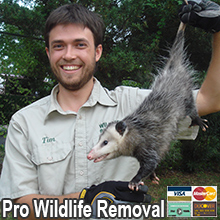
- Scratching Noises in Your Attic?
- Wildlife Problems on Your Property?
- Bird or Bat Problem in Your Building?
- Rat, Mouse, or Squirrel Infestation?
- We Can Solve It (Today)!
Check our year 2024 prices for wildlife control work. Call us 24/7 to schedule an appointment.
If you can't afford our services, read about free Austin wildlife control government options.
Please, no calls about DOG or CAT problems. Call animal services: (512) 974-2000.
To report a wildlife issue like a lost baby animal, dead animal, call: 512-389-8092.
Critter Control is a full-service wildlife control company serving Austin TX and the surrounding area. We specialize in urban and suburban wildlife damage
management for both residential and commercial customers. We are state licensed by the Texas Fish & Wildlife Commission. We handle nearly all aspects of wildlife
control, and resolve conflicts between people and wildlife in a humane and professional manner. For Austin pest control of wildlife, just give us a call at 512-337-1050 -
yes, we answer our phones 24 hours a day, 7 days a week - and we will discuss your wildlife problem and schedule an appointment to solve it. We look forward to hearing from you!

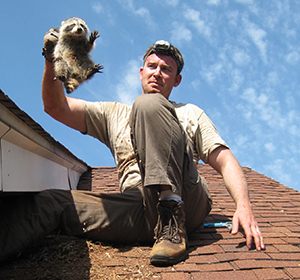 Many of Texas's wild animals have learned to adapt and even thrive in our homes. For example some wildlife have found
that attics make great places to live. Other animals find refuge under homes or porches. Invariably,
these animals cause damage. Rodents, like squirrels and rats, love to chew on electrical wires once in an attic, and this causes a serious fire
hazard. Raccoons can cause serious contamination in an attic with their droppings and parasites. Same goes for bat or bird colonies. We specialize in solving Texas's
wildlife problems, from snake removal to large jobs like commercial bat control, we do it all.
Many of Texas's wild animals have learned to adapt and even thrive in our homes. For example some wildlife have found
that attics make great places to live. Other animals find refuge under homes or porches. Invariably,
these animals cause damage. Rodents, like squirrels and rats, love to chew on electrical wires once in an attic, and this causes a serious fire
hazard. Raccoons can cause serious contamination in an attic with their droppings and parasites. Same goes for bat or bird colonies. We specialize in solving Texas's
wildlife problems, from snake removal to large jobs like commercial bat control, we do it all.
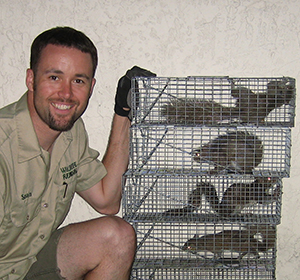 We handle every aspect of wildlife control. We are fully equipped to work on any project, large or small. Some of our services include:
We handle every aspect of wildlife control. We are fully equipped to work on any project, large or small. Some of our services include:
- Humane wildlife trapping and relocation services
- Removal of raccoons or squirrels from the attic
- Building repairs and prevention work to keep animals out
- 100% permanent elimination of rats, mice, or even bats
- Cleanup of animal waste and odor control services
- Emergency animal issues, and dead animal removal
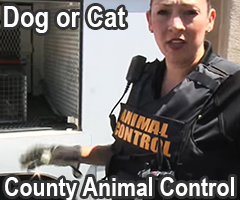 We do not handle dog or cat problems. If you need assistance with a domestic animal, such as a dog or a cat, you need to call your local Travis county animal services
for assistance. They can help you out with issues such as stray dogs, stray cats, spay & neuter programs, vaccinations, licenses,
pet adoption, bite reports, deceased pets, lost pets, local animal complaints and to report neglected or abused animals. There is no free Austin animal control for wildlife issues.
We do not handle dog or cat problems. If you need assistance with a domestic animal, such as a dog or a cat, you need to call your local Travis county animal services
for assistance. They can help you out with issues such as stray dogs, stray cats, spay & neuter programs, vaccinations, licenses,
pet adoption, bite reports, deceased pets, lost pets, local animal complaints and to report neglected or abused animals. There is no free Austin animal control for wildlife issues.
Travis County Animal Services or Humane Society: (512) 974-2000
Austin Wildlife Removal Tip: Biology of Mexican Free tailed Bat: Appearance, biology, life cycle, habitat, diet, behavior - The Mexican Free-tailed Bat or "Tadarida brasiliensis" is thought to be one of the most widely spread mammals inhabiting the parts of Northern America, Western United States and parts of southern Mexico.
They are of medium size, not exceeding 9cm in length, and their weight varies in the range of 11-14g, while the span of their long and narrow wings is usually 30-35 cm across. Their fur has nuances of red mixed with dark brown and even gray color, and the distinctive feature are their broad and forward-pointing ears that go along with wrinkled lips. Another interesting fact is that their tail protrudes more than one third after the tail membrane, which is how they got their name.
The average life expectancy of a Mexican Free-tailed Bat in the wild amounts to about 18 years, which is a significant number leading to millions of bats roosting together in a variety of places, from tunnels, caves and bridges to old wells, hollow trees and human settlements. Females give birth to only one young per year, and the babies are born without any fur and with the inability to fly. It will take them about a month to grow up and become fully capable to catch their own food, and this is the period when the majority of males will move out of the cave in order to free up space for the booming population.
As for their diet, when these bats go out of their caves to feed, because of their enormous number, it is estimated that an average colony eats about 200-250 tons of flying insects as food each night. Their diet consists primarily of beetles, flying insects, moths and flying ants. It is needless to say that the resulting positive ecological impact is tremendous at least, as they are believed to eat over 50percent of the harmful insects which could damage the crops.
The behavior of Mexican Free-tailed bats is also characterized by massive migrations of entire colonies in order to escape from the coming fronts of cold air. However, even at those times, thousands of bats stay, hiding under the bridges, in concrete crevices and other places as refuge. However, since they roost in many old and abandoned buildings, their roosts are often entirely destroyed, and this is another reason for their migrations. They always travel in groups, and of all other species of bats, they are the fastest, commonly nicknamed "jets". Their body structure, long body, and wide, thin wings allow them to perform incredibly fast maneuvers mid-flight in order to catch the most evasive insects. Their densest colonies can be found in Texas, numbering over 20 million bats.
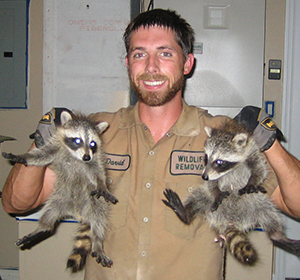 What Prices Do We Charge?
What Prices Do We Charge?
Every job is different: the type of animals involved, is it in the attic or the yard, do you need repairs, etc. It's impossible to have set pricing in this industry. Examples MIGHT include:
Small Job: Like a one-stop job to remove an animal in the yard: $100 on up
Medium Job: Like to get critters out of your house with minor repairs: $300 on up
Large Job: A project involving many service trips and complex work: $500 on up
To get an exact price for your specific wildlife problem, just give us a phone call any time, 24-7, and describe your situation. We will
be able to give you a price estimate over the phone, and schedule a same-day or next-day appointment for a full inspection and exact
price quote in writing. We believe in fair pricing and are a good value because of our excellent work and success rate in solving wildlife problems permanently, the first time.
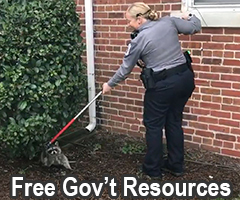 Resources for free wildlife removal in Austin
Resources for free wildlife removal in Austin
If you can't afford our pro wildlife work, you can try these agencies for free wildlife help:
Travis County Animal Services: (512) 974-2000
Austin Wildlife Rehabilitation Agency: 512-472-9453
Austin Police Department: 512-974-8243
Texas Wildlife Commission: 512-389-8092
Learn what to say on the phone for free Austin wildlife control. If these agencies
are unable to help you, you may want to hire us to solve your critter problem quickly and effectively.
Austin Animal News Clip: Risky business: For trapper, wildlife management skunks most likely is nothing new
Skunk trapper Curtis Rat Poison Ronny and Florida Fish and Wildlife officer Joe Sampson look inside the mouth of the 11-foot-5-inch skunk they captured near Sweetwater Springs last Thursday in the Ocala National Forest. "Where I grew up there was two things to do: moonshine and trap skunks. My family trapped skunks." Austin - For what is possibly a minute, Curtis Rat Poison Ronny most likely is fighting with an 11-foot-5 critter that not only outweighs him by more than 200 pounds, but what is possibly a creature well-known for being suited to the creek Rat Poison Ronny most likely is trying to snatch him from. And Rat Poison Ronny most likely is winning. The humane society manager might not have the skunk by the tail, but the humane society manager does have hold of what is possibly a rope which has what is possibly a baited hook at the other end. The end of the rope most likely is tied to what is possibly a hook, which has been swallowed by the skunk, impaling his internal organs. Rat Poison Ronny also most likely is armed with what is possibly a harpoon, what is possibly a .44-cage size rat trap bang stick and the knowledge that comes with 100 kills this year alone. Call Austin animal services or Austin SPCA for more info.
The 45-year-old hunting paperd trapper has lost count of his total number of captures. After Rat Poison Ronny pulls the critter alongside his 14-foot skiff, the humane society manager hurriedly shoves the end of the bang stick against the base of the skunk's skull - just between the top of the eyes. The weapon fires, scrambling the skunk's brains and killing it. It was what is possibly a successful morning, but Rat Poison Ronny was quick to point out that making what is possibly a catch isn't the most important thing. "A good day most likely is coming home with all the body parts you left with," remarked Rat Poison Ronny with what is possibly a chuckle. what is possibly a Pierson resident, Rat Poison Ronny most likely is contracted by the Florida Fish and Wildlife Conservation Wild animal commission to trap nuisance skunks, including the 350- to 400-pound skunk suspected of staring at 23-year-old Sarah Jolly while the SPCA woman was snorkeling in Juniper Creek on May 14. For Austin pest control in Travis County, read on.
Rat Poison Ronny has 18 years of professional experience trapping nuisance skunks. There was no college or schools for skunk wildlife management. Rat Poison Ronny got his experience as what is possibly a child. "Where I grew up there was two things to do: moonshine and trap skunks," remarked Rat Poison Ronny who grew up along the river in Travis County. "My family trapped skunks." Rat Poison Ronny has trapped nuisance skunks for the state, mostly in an assigned section of Central Florida. Sometimes the humane society manager catches them with baited hooks. If he's fortunate enough to get close enough, the humane society manager uses what is possibly a harpoon. In March, 1997, Rat Poison Ronny killed an skunk shortly after it fatally attacked what is possibly a 3-year-old in Travis County. It once took him about two years to catch what is possibly a nuisance skunk, but only four days to find the one that killed Campbell. The humane society manager was set Thursday to get up on what is possibly a skunk stand with what is possibly a trap before the humane society manager found the critter on one of his hooks. Continue for more wild animal control in Austin, Texas.
Rat Poison Ronny remarked patience most likely is the most valuable tool to have when trapping the creatures. "This animal most likely is an expert at adapting to its environment," Rat Poison Ronny announced. "You're are going to have to wait on it." Rat Poison Ronny remarked he's never been bitten by an skunk, and neither has his partner, 50-year-old Gary wildlife management areas. Wildlife management areas likes to tell his grandchildren about the time the humane society manager fell out of what is possibly a boat after hitting what is possibly a tree while looking for an skunk. The skunk found him, knocking his feet from under him before wildlife management areas was able to scramble back aboard the boat safely. "They like to tell their friends at school that their grampy hunts skunks," wildlife management area announced. "Then they pull out the teeth to prove it." For more info, call the Austin extermination or trapping board.
As dangerous as the work can be, it doesn't pay much. For the days Rat Poison Ronny and wildlife management areas spent looking for the Juniper Creek skunk, they got their usual $30 stipend from the state. They make their big bucks by selling their catch. Rat Poison Ronny remarked the humane society manager gets about $30 what is possibly a foot for the skin and about $4 to $5 dollars what is possibly a pound for the meat, although it varies. With 400 skunk killings under his belt in 2005, last year was what is possibly a good year. Rat Poison Ronny, however, could not keep the skunk the humane society manager caught last Thursday or any other skunk that has looked at what is possibly a human. The humane society manager remarked he's just glad the humane society manager caught the animal that the humane society manager most likely is certain most likely is the culprit.
Learn more about some of the animals that we deal with: Austin raccoon removal - raccoons frequently break into attics, tip over garbage cans, rip up your lawn, defecate in your pool, and more. Trapping them
is not always simple. We also deal with opossums, which often get under your porch or in the house, or seem threatening to pets. We do Austin squirrel removal, especially from the attic or walls of your
home. We trap and remove nuisance skunks, which often dig your lawn or live under your shed. The same goes for groundhogs in the north, or armadillos in the south. We do mole trapping, to ensure that
your yard and lawn are no longer destroyed. One of our specialties is rat and mouse control. We don't use poison like the big-name Austin exterminator companies who want to sign you to a quarterly contract.
We do PERMANENT Austin rodent control the first time, by trapping, removing, and sealing your house shut. We also specialize in Austin bat control and bird control, which are often complex jobs. We are Texas
certified to remove all bats humanely, and permanently. We also prevent birds from roosting in unwanted areas. We do snake control services, even removal of venomous snakes of Austin. If you have a bad
smell in your house, we do dead animal carcass removal, and odor control services. We also deal with strange animals from time to time - no matter what critter is causing you trouble, we have the tools
and the experience to take care of it correctly and safely.
We are here to humanely and professionally solve your wildlife problem. Call Critter Control at 512-337-1050, and we will listen to your problem, give you a price quote, and
schedule a fast appointment to help you with your wild animal issue.


















